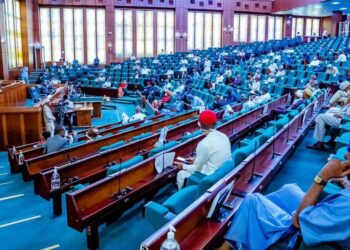The National Film and Video Censors Board (NFVCB) has reported that it processed and categorized 274 films from Nigeria’s film industry in the first quarter of the year.
Dr. Shaibu Husseini, the board’s Executive Director/CEO, revealed this information in a statement on Monday in Abuja.
According to the NFVCB boss, the data was gathered by the board’s Department of Film Censorship and Classification and covers a variety of film genres, the News Agency of Nigeria stated. This report will be submitted to relevant federal agencies to contribute to the calculation of Nigeria’s Gross Domestic Product for Q1 2024.
When compared to the same period of 2023, it was gathered that the NFVCB processed 280 films, a 2.14% drop year on year, based on an earlier report.
The majority of the films produced during this period were in English, with 250 out of the total being in that language. The remaining films were in Yoruba, Igbo, Hausa, and Hindi.
An analysis of the films’ classification by target audience showed that over 50 percent of the total films were rated ’18’, intended for mature audiences. Films rated ’15’, ’12’, those requiring Parental Guidance (PG), and those suitable for ‘General’ viewing followed in decreasing order.
The NFVCB, a federal government agency responsible for regulating Nigeria’s film and video industry, is empowered by law to classify and register all films and videos, regardless of their origin. The board also maintains a register of film and video outlets across the country.
Recommended reading: Nigerian box office generated N19 billion revenue in 3 years
What you should know
Established under Act No.85 of 1993, the National Film and Video Censors Board assumes a pivotal role as the regulatory authority overseeing Nigeria’s dynamic film and video sector. Backed by law, the Board holds the authority to categorize all films and videos, irrespective of their origin, be it imported or locally produced.
Furthermore, the Board also registers every film and video outlet nationwide, while maintaining a comprehensive registry of such registered establishments, among other prescribed responsibilities.
























Far too many.
That is over 90 movies a month!
It means that films were shot very quickly: one take only, no location changes, reusing actors and props, and shallow plots and storylines.
Movies are like soup: the best takes time.
Solid actors have to be found. They need time to master their roles. Appropriate locations (not just rich people’s homes!) must be secured. Storylines must be layered, with the right combination of intrigue, humour and tension. Theme and incidental music must be thoroughly composed and made appropriate to the type of film.
Is it any wonder that most of us can tell how the typical Nollywood film will end, five minutes into it?
Nollywood is yet to realize that quantity is no substitute for quality.
Ms. Funke Akindele and a few others are distinguished exceptions.
May there be more like them!